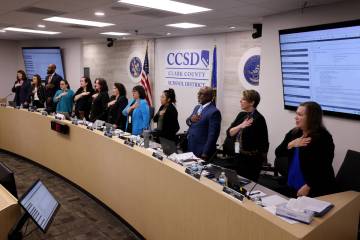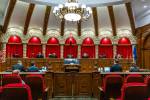EDITORIAL: State Dems ask court to gut tax restraint initiative
The Nevada Supreme Court on Monday heard arguments in a case involving an end-run around the state constitution, and the hearing was quite instructive.
In 2019, legislative Democrats passed bills nixing a scheduled decrease in a payroll tax and extending a “temporary” technology fee applied to DMV transactions. The moves increased state revenue by more than $50 million a year.
One problem: Nevada voters in the 1990s twice approved the Gibbons Tax Restraint Initiative, a constitutional amendment demanding that lawmakers pass any state tax hike by a supermajority. The language is so clear that even a Democratic legislator should be able to grasp it: A two-thirds vote in both houses is “necessary to pass a bill or joint resolution which creates, generates or increases any public revenue in any form.”
Neither of the 2019 bills in question passed the Senate with two-thirds support. Republican lawmakers sued and prevailed last year in District Court. Democrats appealed to the state Supreme Court.
Democrats argue that the higher threshold was unnecessary because the bills kept tax rates at the same level and thus didn’t actually increase revenue. The Legislature Counsel Bureau, which offers legal advice to lawmakers, provided cover for this dubious position with an opinion worthy of Lewis Carroll, maintaining that the Gibbons initiative doesn’t mean what it says.
The illogic of this position should be obvious. The entire point of passing the two bills was to raise money. Absent legislation, collections from the two tax sources would have fallen. Ergo, the measures generated revenue and needed two-thirds support to comply with Nevada law.
Attorneys representing legislative Democrats kept swinging and missing in front of the justices. Nevada Deputy Solicitor General Craig Newby argued, “There is ambiguity within the term ‘increase.’ And under those circumstances, legislators are entitled to some deference … based on separation of powers.”
Wrong. There is no ambiguity, and it is the precise role of the judiciary to hold lawmakers accountable when they ignore constitutional requirements. It’s even more outrageous that Mr. Newby would cloak himself in the separation of powers principle when the lawmaker who rammed through these tax hikes in the upper chamber on a majority vote — Majority Leader Nicole Cannizzaro, D-Las Vegas — moonlights as a Clark County prosecutor and is serving in Carson City in violation of the state constitution’s separation of powers clause.
The justices seemed skeptical of the argument that the supermajority mandate didn’t apply. Good. But it would be a fool’s errand to predict where the Supreme Court will eventually come down. Suffice it say, however, that a ruling which sanctions this Democratic chicanery would be an affront to both the rule of law and Nevada taxpayers.




























